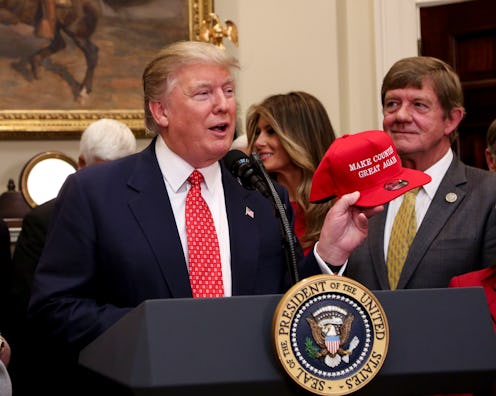News
How Trump's First 100 Days Proved "America First" Is Dangerous

As President Trump approaches the ever-important 100-day mark of his presidency, it's easy to count the campaign promises he has broken. He hastily abandoned his attempt to "repeal and replace" the Affordable Care Act, and he has not yet managed to secure funding for the infamous Trump wall. Still, there's one big promise that the president has lived up to: Trump is putting America first in just 100 days in office and he's telling the world to be on high alert.
It was this time last year that Trump announced the "America First" theme. It's a catchy title, but Trump's implementation of the policy since his inauguration seems questionable. The idea behind America First is exactly what it sounds like: Trump wants to protect American interests in realms like employment, manufacturing, and trade. According to the White House website, America First is even the name of the Trump administration's foreign policy and energy plan.
Certainly, protecting American interests is the job of the president. But the question for Trump's team is, at what cost? The America First policy is evident in Trump's repeated attempts to enforce an executive order that bans certain people from the United States. It's also obvious in the lack of foreign trips he has taken while in office. Whether he's blatantly shutting the world out or simply making the people who are welcome come to him, the president's America First ideology could send a message to the world that America is first a bully.
For all of the traveling that he does between Washington and Florida, Trump doesn't seem to be a fan of international travel. His so-called "travel bans" would have prohibited men and women from certain countries from entering the United States, had they not been blocked by the court system. The administration justified the travel bans — which one Hawaii court saw as the manifestation of the president's so-called "Muslim ban" — as measures to protect the American people, but in reality, they caused widespread uproar. After the president issued the first controversial executive order, protests arose at several of the nation's airports, even causing delays in Los Angeles.
Then, there's the president's own itinerary. To date, Trump hasn't taken a single foreign trip as president. Instead, he has met with world leaders in Washington, D.C., or at his Mar-a-Lago club. In doing so, he has fallen far behind his predecessors: The four previous presidents had all taken at least one international trip by this point in their presidency, with President Obama having taken a whopping nine trips by now. It's as if Trump is symbolically putting America first by staying put within its borders.
Last week, Trump announced his "Buy American and Hire American" policy, arguing that current trade deals and immigration policies put American companies and workers at a disadvantage. However, at the 100-day point, it's hard to gauge what impact his directive will have, as it only calls for a review of current processes and recommendations for reforms.
Finally, there's the environment. Rumor has it that the Trump team isn't sure whether to follow through on the groundbreaking Paris climate accord from last year. Scott Pruitt, Trump's head of the Environmental Protection Agency, called the accord "an America second, third, or fourth kind of approach." Although it's too early to tell what Trump will actually do with the accord, if he withdraws in the name of America First, the world would instantly get a message that the United States doesn't care to work with it on environmental issues.
Trump's America First policy is far from a broken campaign promise. Rather, it's the very foundation of his 100-day "successes." As his presidency continues, it's the message that those successes send to the rest of the world that could become problematic.